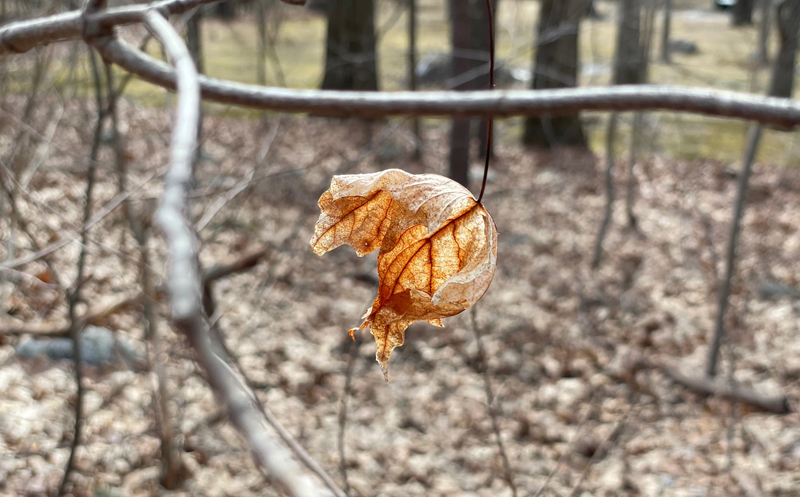
March 19, 2023
I recently learned there was a word for the kind of leaves that ‘hung around’ after the others fell. “Marcescence” is the phenomenon, and trees such as oak, beech, and hornbeam are known to participate. These trees, with marcescent leaves, don’t drop them until spring, when a bud forces the separation at the abscission zone.
Frankly, I’m not sure how I feel about this new-found knowledge. Before this, I used to call them “ghost leaves” or liken them to the wings of moths. Much more creative, I think.
- From Absent:
“Oh, look! We’re almost there.” She pointed ahead to a group of nearly imperceptible rooftops. RT strained to see the outline of buildings. They were as soft as the surrounding fog, though edged in a slight glow. As the two of them approached what appeared to be a small city, he noticed the streets were paved with crushed shells like those on the driveways on Cape Cod. Along each side of the road were trees of equal height, bark white as birches, with leaves that resembled the dusty wings of moths.
“I can’t help but notice there is very little color here,” RT remarked. “Do you not find it difficult to distinguish things?” he asked.
“On the contrary. We prefer a neutral palette. That way we can augment with whatever colors we want,” Astral explained.”
…
Likewise, I love going outside after it rains, when the air is filled with ozone, and everything feels fresh. I always thought of this as a comingling of earth and sky, a lung-filling indulgence. I’m not sure “petrichor” has the same impact. In a short story I’m working on, I describe this kind event through emotions, with ‘petrichor’ inserted only as an afterthought.
- From Oliver and Odetta:
“Odetta let go of Oliver’s hands and reached hers into the air. She took a small, forked branch out of her apron pocket and swept the horizon. The clouds continued to billow, and soon there was a streak of lighting, followed by the growl of thunder. A second crack of lighting hit – a sizzle, it seemed – and then, a deafening boom.
The foursome stood there, dwarfed by the magnitude of a raging storm.
The first splats of water landed at their feet, exploding into puffs of dust. The next splats pelted the soil more aggressively. No one moved as the heavens opened. Sheets of water poured from the sky, drenching them, and obscuring their vision. Puddles formed on the parched ground. The smell of ozone and earth – petrichor – filled their nostrils and their lungs. They laughed until they cried, giddy with joy and hope. They forgot their differences and danced in the rain.”
…
Add to this list, the word “Brocken Spectre” because it is such a strange phenomenon. In this situation, an image is reflected from a bank of clouds. While I’m not currently using the phrase in what I’m writing, I’d much rather be enticed by an enormous shadow rising on the hillside, the sight of an airplane diffused by an aura, an elongated version of the observer, standing splay-legged on the horizon. Mystical. Magical. Elusive.
Ditto for “Pareilodia,” which prior to being assigned a scientific term, was to me, the wonder of seeing animals in the clouds… the dragon that morphs into a dancer, the turtle that turns into a bird. In this instance, I’m not sure terminology adds to the experience but rather, detracts from it.
Not to disparage science. I love science. But often, the words we invent allow us to imagine and interpret more freely. We opt for the less obvious, call on the senses, develop a unique perspective. Without the ‘correct term,’ we have greater license to be creative. Thus, the wonder of writing — and reading.